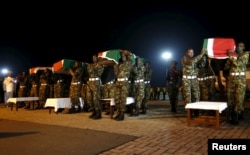Kenyan President Uhuru Kenyatta has vowed al-Shabab militants will pay “a heavy price” for the attack Friday that reportedly killed dozens of Kenyan soldiers in southern Somalia.
Speaking in a nationwide broadcast Tuesday, Kenyatta said Kenya is “unbowed."
The flag-draped caskets of four Kenyan soldiers killed in Friday's attack arrived at Nairobi's Wilson Airport late Monday. Top military officials were there to receive the bodies.
Al-Shabab has said it killed up to 100 Kenyan soldiers in its attack on an African Union base in the Somali town of El-Adde. There has been no independent confirmation of the claim and Kenyan officials have not released any casualty figures.
Kenyatta said, “As I speak to you today, our defense forces are conducting intense search, rescue and recovery operations to make sure we bring home our fallen and our injured heroes that have been and remain our key priority."
Kenyatta reaffirmed Kenya’s commitment in stabilizing Somalia and vowed to take the fight to al-Shabab.
“We are determined and committed to pursuing those criminals who perpetrated this act and to ensure that they shall pay heavily for their crime. Our soldiers did not die in vain," he said.
On Tuesday, Kenyan troops retook control of El-Adde without a fight after al-Shabab members slipped away into rural areas. Most residents of the small town have fled, fearing more attacks.
Father awaits news of son
The father of a Kenyan soldier who has been missing since the attack spoke to VOA's Somali Service of his family's worry and heartbreak.
Abdinasir Issa Abdi, 23, is part of 9th Kenya Rifles unit that arrived in El-Adde just two days before the attack.
His father, Issa Abdi, said his son departed another base on January 4 as part of a troop rotation and sent him a message nine days later to say that he had arrived safely.
“He sent me a message saying he is in El-Adde and is doing fine,” he said Tuesday in a telephone interview.
Two days later al-Shabab attacked the base. “We heard they were attacked, that soldiers were killed, and they are scattered,” Abdi said.
He rang his son’s phone, but there was no reply. Abdi says he now fears the worst but does not know what exactly happened. The government is not giving out any concrete information, he says.
Abdi, who is an ethnic Somali from Wajir, ruled out travelling to Somalia.
“I’m not the government, I can’t go to Somalia, I don’t know the people. I guess those who captured [the base] are Somalis. Allah may save him.”
Kenyan troops working with the African Union have battled al-Shabab inside Somalia since October 2011.
The Islamist militant group has since carried out several major terrorist attacks in Kenya, including shooting rampages at Westgate Mall in Nairobi and Garissa University College. The Garissa attack in April was the deadliest, killing 148 people.
Some sectors of the Kenyan society are calling for the withdrawal of the Kenyan army from Somalia, but President Kenyatta is appealing to Kenyans to unite.
“Every Kenyan must understand that this war demands our unity as a nation and we must stand shoulder to shoulder and face together the enemy of humanity," he said.





